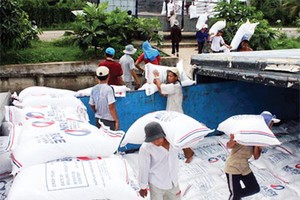The recent round of rice speculation has highlighted several problems for the city, especially the lack of a good distribution system.

When prices rocketed up and residents jostled at the market and in the shops, the city wanted sellers to bring more rice to market.
But the sellers did not know who they could go to for more rice. Luckily, there is a large retailer in Ho Chi Minh City – the Co.opMart system. The chain played an important as a middleman during the rice fever. The crisis eased after several days.
After the rice crisis, there was a similar bubble in the cement market. The city was unable to find distributors large enough to stabilize the cement market.
Cement producers said that their production was normal and that they sold their products at appropriate prices. But cement dealers increased prices due to high demand. Price control and management are thus out of producers’ reach.
Something similar to the cement price bubble happens in other sectors when a crisis occurs. Although production is stable and producers can meet the demand of the market, prices increase because dealers raise prices.
According to a road map made up by the World Trade Organization, foreign enterprises will be permitted to enter Viet Nam’s retail market by the end of this year. The heat of the open market is affecting the domestic economy.
Meanwhile, the domestic distribution system is scattered, small, and has developed in an unplanned way.
There are about 9,000 markets, 200 supermarkets and shopping malls and 100,000 grocery stores nationwide. But the market system has been degraded. Supermarkets and malls have been promoted by private owners including foreign groups. In foreign-owned malls, domestic products are pushed out.
The problem is that the nation lacks a resilient distribution system to connect producers and consumers.
In other words, no one controls the market. The truth of the market economy is that those who control the distribution system will control producers and products.
If the government does not create a proper and professional distribution system, not only will Vietnamese enterprises lose ground in their own country, but production will be stagnated.























